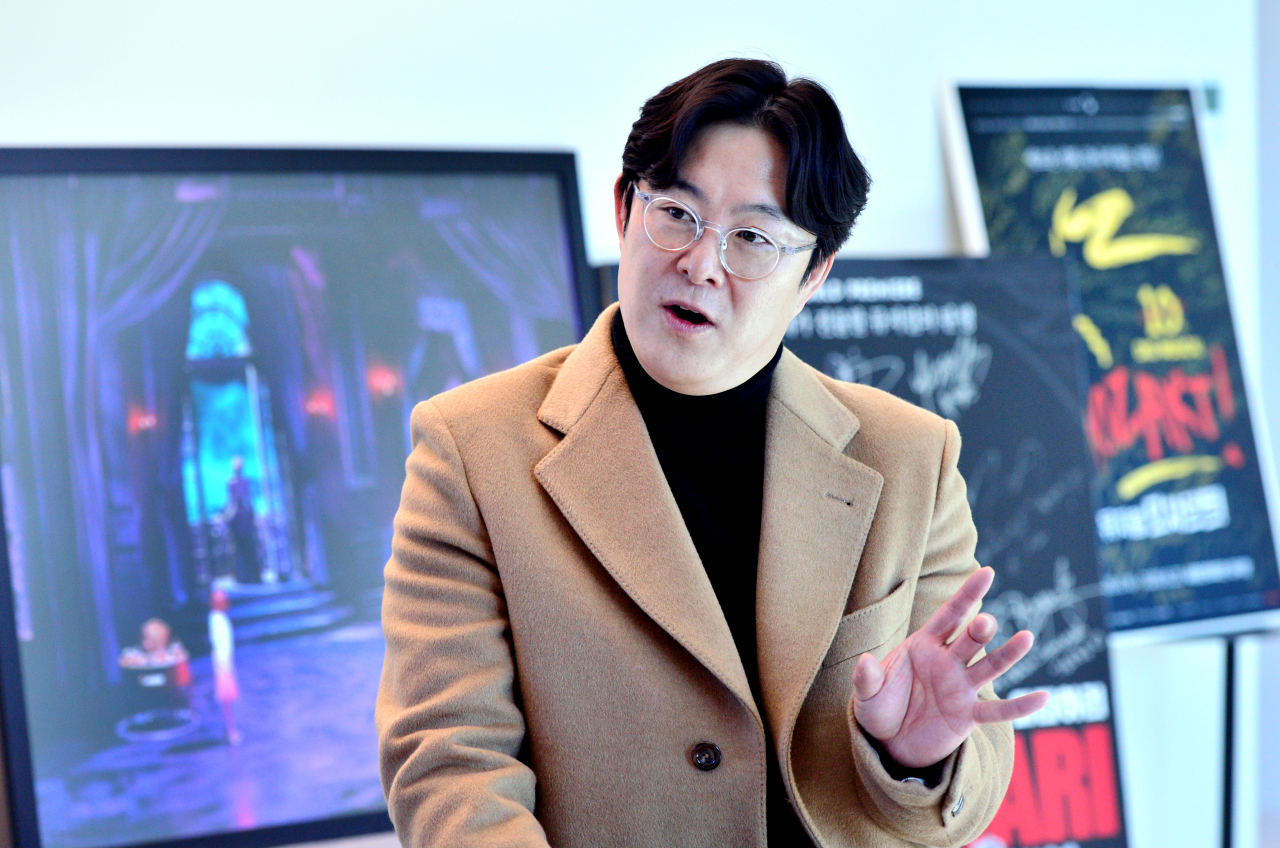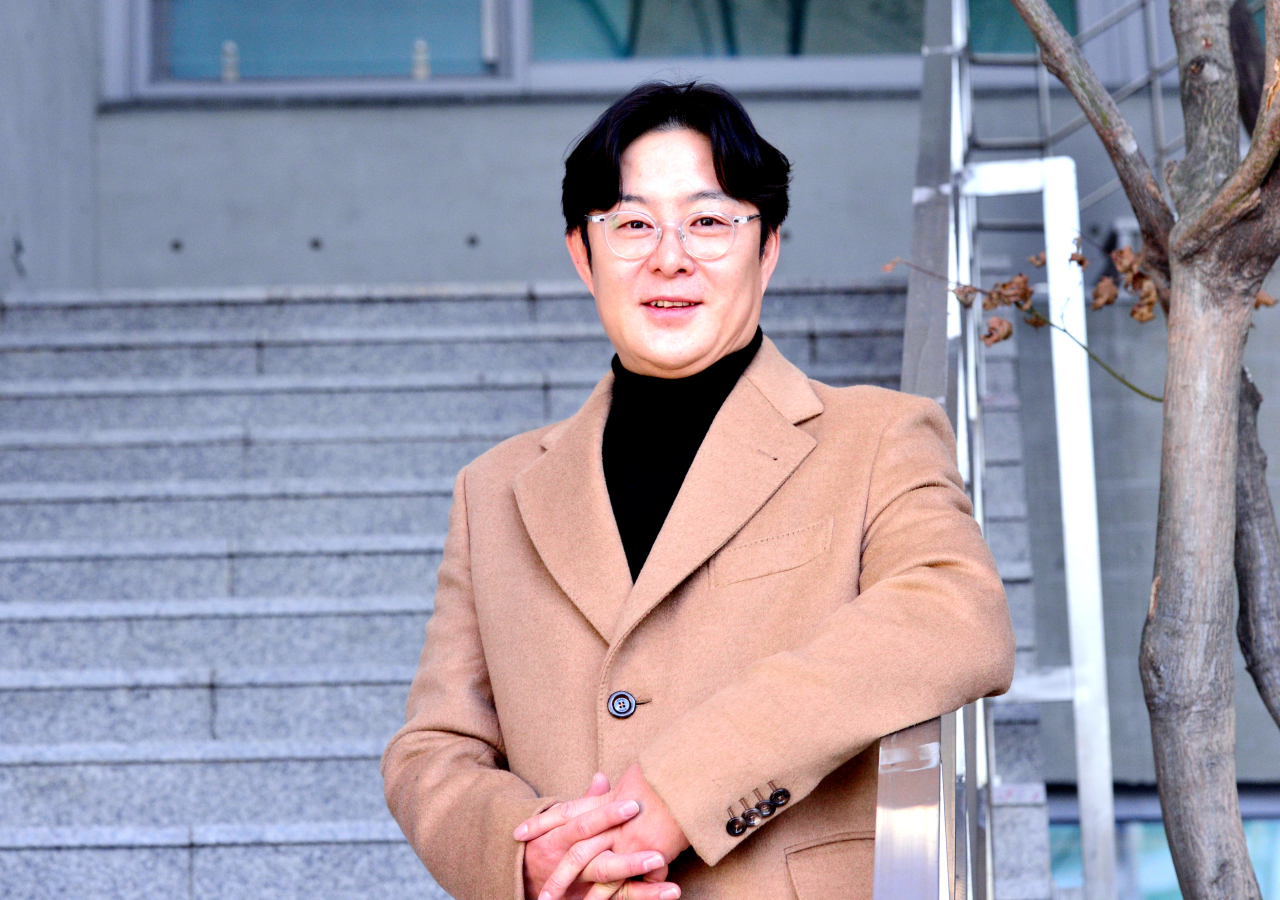 |
CEO and chief producer of EMK, Eom Hong-hyeon, speaks during an interview with The Korea Herald on Dec. 13. (Park Hyun-koo/The Korea Herald) |
During the first few months of the COVID-19 pandemic and the consequent social distancing measures, musical producer Eom Hong-hyeon may well have been depressed. The CEO of EMK Musical Company, although previously upbeat and outgoing, recalled spending many of his days in despair.
This wasn’t without good reason. Just before the pandemic hit, Eom had been planning to launch an office in the US, having been left frustrated and disappointed after meeting renowned musical producers in the US and the UK. Eom recalled their unanimously pessimistic responses, which left him feeling that, as someone from an Asian country that has less than 30 years of history in this industry, it would be incredibly difficult, if not impossible, for him to become a lead producer on Broadway or the West End.
Rather than being discouraged by this feedback, however, Eom returned to Korea, galvanized in his determination to establish himself in the West with his own production company in the US. Due to the pandemic, unfortunately, he had been forced to put these plans on hold.
As soon as the pandemic ends, Eom plans to return to this plan, ironically with more confidence because of COVID-19.
Eom believes the past two years provided the country’s theaters a chance to continue to grow and narrow the gap with Western theater scenes.
In contrast to many theaters in the West, which were closed for months on end, South Korea’s musical theaters closed for only six weeks over the last two years, thanks to strict social distancing rules for audiences, which mandated wearing masks at all times and prohibited drinking and eating inside theaters.
 |
CEO and chief producer of EMK, Eom Hong-hyeon, speaks during an interview with The Korea Herald on Dec. 13. (Park Hyun-koo/The Korea Herald) |
Thinking of harder-hit theatrical communities across the world, Eom said, “Many actors and theater crew were forced to leave the stage and those lengthy pandemic shutdowns were long enough to hurt them in many ways.“
“These last two years, I believe, have been a very fortunate, precious time for Korean musical actors and crew, despite theaters operating less than usual,” Eom told The Korea Herald during an interview on Dec. 13.
Beyond this, the Korean musical theater industry’s global expansion will also likely benefit from the growing popularity of K-culture, as evidenced by the success of ”Parasite,“ ”Squid Game“ and BTS.
Eom said the Korean musical industry might enjoy amplified interest from non-Korean audiences.
“Even before the pandemic, many fans from many Asian countries made trips to Korea specifically to see musicals. I’m really looking forward to seeing this trend expand to global K-pop fans once the borders open up again,” Eom noted.
Although Eom is now one of the most successful producers in Korea, he is no stranger to being an outsider. Having grown up in a small community with little live theater, Eom had only worked on musicals before the age of 30. It was only after Eom fell in love with this multidisciplinary art later in his life that he became a musical producer.
Even after the spectacular failure of his debut musical, ”Dracula,“ in 2006, which left his then newly founded company, EMK, some 1.8 billion won ($1.5 million) in debt, Eom was able to stage a remarkable comeback with the hit 2009 musical “Mozart!” that featured former TVXQ member, Kim Jun-su. This role not only launched Kim’s career as a musical actor, as he went on to star in more than 10 musicals afterward, but also introduced a trend of K-pop idols transitioning into musicals.
“Mozart!” remains one of EMK’s most successful productions, having been reproduced multiple times. EMK has many other titles on its roster, including a number of successful European musicals, such as “Rebecca” and “Elisabeth,” which Eom imported to Korea in an attempt to distinguish his company from the competition. He has also ventured into developing original content, including “The Man Who Laughs,” “Xcalibur,” and “Mata Hari.” Significantly, these too also share plots drawn from non-Korean sources that are familiar to global audiences.
In his role as producer, he has brought onboard global talent, notably world-renowned composer Frank Wildhorn and musical director Robert Johanson to create EMK’s original productions. His decision to collaborate with renowned creatives from abroad has raised criticism from the Korean public, who feel that such involvement of foreign talents prevents his original productions from being authentically Korean.
These creative relationships with Western industry leaders are no accident, but rather Eom’s strategy for creating a globally renowned production.
“Culture no longer exists in a national vacuum. Productions don’t have to be 100 percent Korean to earn the label ‘Korean.’ If you create the world’s best production, you can work with the world’s best composers, the world’s best actors, the world’s best everything, regardless of nationality,” Eom said.
Eom is eager to expand beyond the limits of the Asian market, partly because of the size of the Korean musical industry. Although musicals account for more than 70 percent of the nation’s theater revenue as of 2020, this industry will be unable to sustain its growth leveraging just South Korea’s population of 60 million, according to Eom.
“Although I don’t think the market in South Korea is saturated yet, you’d need an audience size of around 150 million to achieve this sort of stable growth,” he said.
Eom hopes his next production, another original piece titled ”Beethoven,” will resolve these issues.
He is working again with the beloved musical duo Hungarian composer Sylvester Levay and German lyricist Michael Kunze, who are behind “Mozart!” “Elisabeth,” “Marie Antoinette” and “Rebecca. With this winning combination of talents, Eom hopes that ”Beethoven“ will be the one that launches Korean musicals onto the global scene.
“Before the pandemic, I only dreamed of casting well-established Western actors in any Korean musical that could make it to Broadway or the West End. But now I hope to cast BTS’ V, whom I’ve heard has a keen interest in musicals. If we’re able to make this a reality, it would attract global audiences to Korean musicals,” he said.
Through all of this, Eom has his eyes on the future. “Whatever I do as a producer, I am most eager to pave the way for future generations of producers.”
By Park Ga-young (
gypark@heraldcorp.com)









